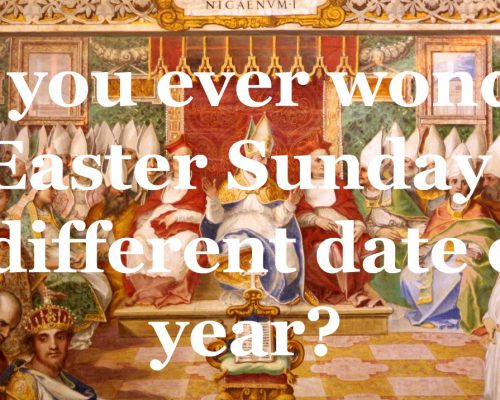Why does Easter Sunday fall on a different date every year?
Have you ever wondered why Easter Sunday falls on a different day every year? Why is does the date change? Why does it not have a fixed date like Christmas for example? Well, the reason is quite simple, or not!
It’s hard to imagine riots in the streets, pamphlet wars and vicious rhetoric spawned by such a question, but that was the nature of things in A.D. 325, when Constantine was forced to take action to quell the controversy.
That summer, 318 bishops from across the empire were invited to the Turkish town of Nicea, where Constantine had a vacation house, in an attempt to find common ground on what historians now refer to as the Arian Controversy. It was the first ever worldwide gathering of the Church.
The Christianity we know today is a result of what those men agreed upon over that sticky month, including the timing of the religion’s most important holiday, Easter, which celebrates Jesus rising from the dead.

In A.D. 325, the Council of Nicaea set the date of Easter as the Sunday following the paschal full moon, which is the full moon that falls on or after the vernal (spring) equinox. In practice, that means that Easter is always the first Sunday after the first full moon that falls on or after March 21. Easter can occur as early as March 22 and as late as April 25, depending on when the paschal full moon falls.
What Is the Significance of the Paschal Full Moon?
We know that Easter must always occur on a Sunday, because Sunday was the day of Christ’s Resurrection. But why the paschal full moon? Because that was the date of Passover in the Jewish calendar, and the Last Supper (Holy Thursday) occurred on the Passover. Therefore, Easter was the Sunday after Passover.
Approximate Dates Are Necessary
The Church does not use the exact date of the paschal full moon but an approximation, because the paschal full moon can fall on different days in different time zones, which would mean that the date of Easter would be different depending on which time zone you live in.
For calculation purposes, the full moon is always set at the 14th day of the lunar month (the lunar month begins with the new moon). Likewise, the Church sets the date of the vernal equinox at March 21, even though it can occur on March 20. Both approximations allow the Church to set a universal date for Easter.
Why Do Eastern Orthodox Celebrate Easter on a Different Date?
Still, Easter isn’t celebrated universally on that date—at least not on the calendar we all use in everyday life. While Western Christians use the Gregorian calendar (the calendar that’s used throughout the West today, in both the secular and religious worlds) to calculate the date of Easter, the Eastern Orthodox continue to use the older, astronomically inaccurate Julian calendar.
Currently, March 21 on the Julian calendar falls on April 3 in the Gregorian calendar. Therefore, for the Orthodox, the Sunday following the 14th day of the paschal full moon has to fall after April 3, hence the discrepancy in the date of Easter. Note that the Orthodox use the exact same formula for determining the date of Easter; the entire difference comes from their use of the Julian calendar rather than the Gregorian one.

Is the Date of Easter Related to Passover?
Many Christians believe that the date of Easter is determined by the date of Passover, and so they are surprised when, in years such as 2008, Western Christians celebrate Easter before the Jewish celebration of Passover.
But look closely once again at the formula for calculating Easter, established at the Council of Nicaea: Easter is celebrated on the Sunday following the paschal full moon. Notice what isn’t mentioned? That’s right: Passover.
A Theological Controversy
In fact, the reason the Council of Nicaea set up a formula for calculating the date of Easter was to separate the Christian celebration of Christ’s Resurrection from the Jewish celebration of the Passover. Some Christians in the early fourth century were calculating the date of Easter according to the Jewish calendar, while others believed it needed to be calculated separately.
The Council of Nicaea agreed with the latter group. While Easter and Passover were related historically—as I noted above, the Last Supper occurred on the Passover—and theologically, the Council declared that the connection between the two holidays ended with the Death and Resurrection of Christ.
Why? Because Christ is the new Paschal Lamb, of Whom the lamb sacrificed at Passover was just a sign or symbol. That symbol found its completion in the sacrifice of Christ on the Cross. Thus, the continued celebration of the Jewish Passover has no theological significance for Christians, because Christ is our Passover Lamb.
That is why Easter and Easter Sunday can, and often does, fall before Passover today.
This article is a collaboration of many sources.






